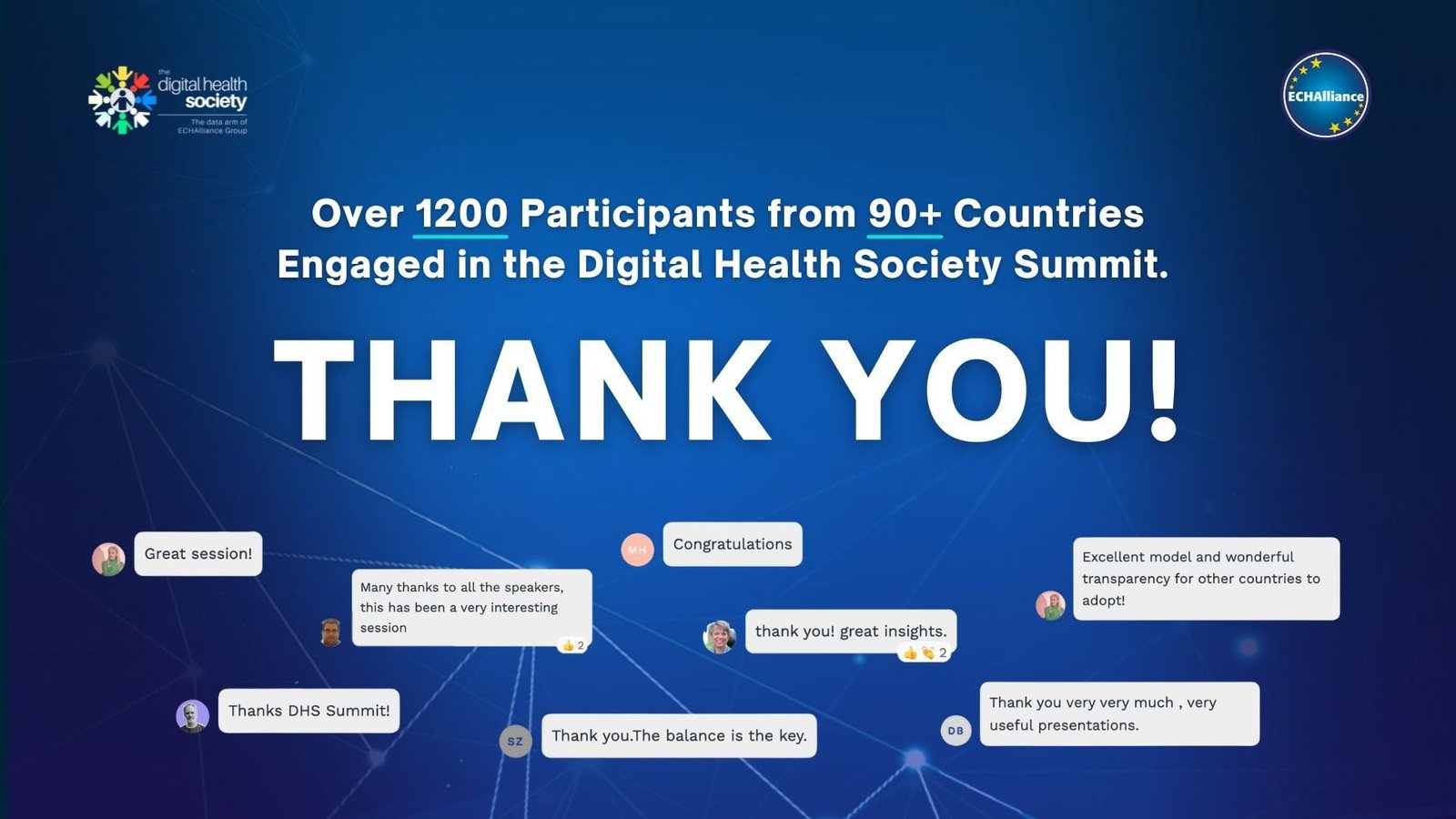On the 14th and 15th of November 2023, the Digital Health Society and ECHAlliance hosted the 5th DHS Summit virtually. The Summit, which promotes the latest thought leadership of the DHS, showcases innovation, research, European funded projects and addresses the latest digital and data challenges facing digital health, continues to grow with 1200 participants from 94 countries, demonstrating that digital health is truly a global market.
2 days programme
+1200 registers
94 Countries
18 Sessions
+40 international speakers
3 Partners
20 virtual exhibitors
Countries represented included:
Argentina, Australia, Austria, Belgium, Bolivia, Brazil, Bulgaria, Cameroon, Canada, Chad, Chile, China, Colombia, Costa Rica, Côte d’Ivoire, Croatia, Cyprus, Cyprus, Czech R, Denmark, Egypt, England, Estonia, Ethiopia, Finland, France, Germany, Ghana, Greece, Hong Kong, Hungary, Iceland, India, Indonesia, Iran, Ireland, Isle of Man, Israel, Italy, Jamica, Japan, Kenya, Latvia, Luxembourg, Macedonia, Malaysia, Malta, Mauritius, Mexico, Moldova, Mongolia, Morocco, Mozambique, Nepal, Netherlands, New Zealand, Nigeria, Northern Ireland, Norway, Pakistan, Peru, Philippines, Poland, Portugal, Romania, Rwanda, Saudia Arabia, Scotland, Senegal, Serbia, Singapore, Slovakia, Slovenia, South Africa, South Korea, Spain, Sri Lanka, Sweden, Switzerland, Tanzania, Thailand, Tunisia, Turkey, UAE, Uganda, Ukraine, Uruguay, US, Vietnam, Wales, Yemen, Yemen, Zambia, Zimbabwe
The KEY HIGHLIGHTS from the discussions of digital health leaders, experts and practitioners, coming from governments, industry, academia and society, included:
The Digital Health Society’s Chair, Bleddyn Rees summarised the 1st day of the Summit 2021 with these 10 takeaways:
1. Changes in Healthcare are not generally fast moving. Bernd Rosenbichier from Germany speaking from a patient perspective explained he would like the pace of change for health data sharing and use needs to be like Speedboat and not the EHDS Oil Tanker. We believe both speeds are required. EHDS infrastructure, standards and processes will take time to implement but many Member States could make much quicker cross border progress like FINDATA and French Health Data Hub.
2. Medtech Europe emphasised that 97% of health data in Electronic Health Records remains unused.
3. “One patient’s health data equals another patient’s medicine”
4. EU Member States must rise above self-interest to allow European Health Data collaboration to deliver EU competitiveness in Pharma and research.
5. European citizens need to flip the privacy argument on its head and say ‘I demand my health data is used.’
ECHAlliance’s Innovation Director, Karolina Mackiewicz summarised the day with these takeaways:
1. Digital Health is Health – digital is not a side story but an integral part of the healthcare system.
2. Public-Private Partnership models for health data sharing are needed: It’s not just about tenders and reimbursement models, we need robust partnerships that bridge the public and private sectors to ensure seamless health data sharing.
3. The benefits for patients in real-time need to be communicated more effectively.
4. Building trust is needed through simplifying procedures, shortening timelines, and enhancing communication.
5. Politicians do not have silver bullets. The scale of challenges will only be solved through much greater collaboration among individuals, civil society, industry, systems administrators, and politicians.
6. Data quality, alignment of standards, and health and digital literacy include the training of citizens, patients, healthcare professionals and administrators.
7. Trust is not something abstract and the entire ecosystem needs to work to build it; it’s not only about “promoting trust.” The acceptance of data-based solutions and uptake depends on that.
8. In her presentation, Rachel Dunscombe said: “We are now in the cognitive age. We must work out how to leverage AI for human benefit and how to govern it all.” Paraphrasing, we can say, it’s not only about AI but about data as a whole.
9. There is certainly a learning curve in order to scale the solutions. On one hand, we accept that we need time to learn, on the other hand, we need to act now. And everyone has a role to play.
Learn more about the DHS Summit23 and check the speakers presentations here.
The conversations continue at the DHWS 2024 in February in Barcelona, join us for more insights here!

